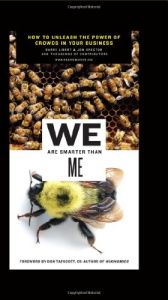Join getAbstract to access the summary!

Join getAbstract to access the summary!
Barry Libert and Jon Spector
We Are Smarter Than Me
How to Unleash the Power of Crowds in Your Business
Wharton School Publishing, 2007
What's inside?
Crowdsourced book about a crowd of sourcing – what a Wiki concept!
Recommendation
This book is an example of its own subject. The byline reads, “Barry Libert & Jon Spector and Thousands of Contributors.” The book, a product of crowdsourcing, reflects both the power and the problems of crowdsourcing. On one hand, it provides many examples of crowdsourcing in action from participants. Almost all of these sagas are success stories (even going so far as to make the reader wonder if some of the anonymous crowd members contributing could have been promoting the companies in the stories). The proliferation of examples demonstrates that crowdsourcing has made its mark in many business functions. On the other hand, the authors (the two writers, not the whole crowd) acknowledge that crowdsourcing has not worked for business management and strategy. Again, the book offers a parallel. The collective authorial voices contribute a lot of information, but they are less than successful in providing the book with a thematic flow, leaving it slightly choppy. However, as one crowdsourcing executive points out in the book, observers must take the bad with the good. Crowdsourcing certainly merits the attention of anyone in business, so getAbstract, all by itself, thinks that this concise, quick-to-read book should be on managers’ reading lists.
Summary
About the Authors
Barry Libert is CEO of an information service for business professionals. Jon Spector is vice dean and director of executive education at the Wharton School at the University of Pennsylvania.



















Comment on this summary